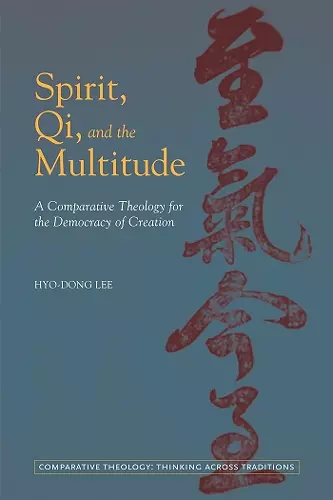Spirit, Qi, and the Multitude
A Comparative Theology for the Democracy of Creation
Format:Paperback
Publisher:Fordham University Press
Published:11th Nov '13
Currently unavailable, and unfortunately no date known when it will be back
This paperback is available in another edition too:
- Hardback£95.00(9780823255016)

A comparative theological and philosophical analysis of the concept of spirit in the West and the concept of qi (ch'i) in East Asia.
A comparative theological and philosophical analysis of the concept of spirit in the West and the concept of qi (ch’i) in East Asia in regard to their respective and mutually illuminating potentials for sustaining a pluralistic and democratic metaphysical vision of the cosmos.
We live in an increasingly global, interconnected, and interdependent world, in which various forms of systemic imbalance in power have given birth to a growing demand for genuine pluralism and democracy. As befits a world so interconnected, this book presents a comparative theological and philosophical attempt to construct new underpinnings for the idea of democracy by bringing the Western concept of spirit into dialogue with the East Asian nondualistic and nonhierarchical notion of qi.
The book follows the historical adventures of the idea of qi through some of its Confucian and Daoist textual histories in East Asia, mainly Laozi, Zhu Xi, Toegye, Nongmun, and Su-un, and compares them with analogous conceptualizations of the ultimate creative and spiritual power found in the intellectual constellations of Western and/or Christian thought—namely, Whitehead’s Creativity, Hegel’s Geist, Deleuze’s chaosmos, and Catherine Keller’s Tehom.
The book adds to the growing body of pneumatocentric (Spirit-centered), panentheistic Christian theologies that emphasize God’s liberating, equalizing, and pluralizing immanence in the cosmos. Furthermore, it injects into the theological and philosophical dialogue between the West and Confucian and Daoist East Asia, which has heretofore been dominated by the American pragmatist and process traditions, a fresh voice shaped by Hegelian, postmodern, and postcolonial thought. This enriches the ways in which the pluralistic and democratic implications of the notion of qi may be articulated. In addition, by offering a valuable introduction to some representative Korean thinkers who are largely unknown to Western scholars, the book advances the study of East Asia and Neo-Confucianism in particular.
Last but not least, the book provides a model of Asian contextual theology that draws on the religious and philosophical resources of East Asia to offer a vision of pluralism and democracy. A reader interested in the conversation between the East and West in light of the global reality of political oppression, economic exploitation, and cultural marginalization will find this book informative, engaging, and enlightening.
"Spirit, Qi, and the Multitude is a fascinating and creative study in comparative philosophy and theology that achieves two major objectives with flair and insight. The first accomplishment is Lee's creation of an extended dialogue between the Western process-philosophical and theological tradition inspired by Whitehead with a series of the most innovative Korean Neo-Confucian philosophers. This is a complex and fluent work that will stimulate and intrigue comparative philosophers, theologians and students of Asian Confucianism - indeed a rare achievement on all levels of scholarly dialogical intricacy. Many scholars have sensed the compatibility of Whiteheadian process thought with Korean Neo-Confucianism, and in Spirit, Qi, and the Multitude both sides of the comparative equation are encouraged to talk intelligently and successfully to each other." -- -John Berthrong Boston University "This is a highly creative, original, powerfully expressed and deeply researched book." -- -Robert Neville Boston University "This is a very original and substantive contribution to Whiteheadian process theology, comparative theology, Neo-Confucian studies, and Asian theology, remarkable for the sheer number of sources synthesized, the thoroughness with which systematic, ontological questions are raised and analyzed, and the consistency of commitment to postmodern values with which the sources are critiqued and retrieved." -- -Anselm K. Min Claremont Graduate University "Rippling between East and West, between the energizing depths of mysticism and the democracy of the restless multitude, this text it foments an unprecedented coalescence of political and comparative theology." -- -Catherine Keller Drew University, The Theological School
ISBN: 9780823255023
Dimensions: unknown
Weight: unknown
376 pages